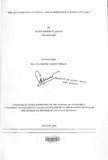| dc.description.abstract | Capital formation is a term used in national accounts statistics and macroeconomics. It basically refers to the net additions to the (physical) capital stock in an accounting period, or, to the value of the increase of the capital stock; though it may occasionally also refer to the total stock of capital formed. Thus, capital formation equals fixed capital investment, the increase in the value of inventories held, plus (net) lending to foreign countries, during an accounting period. Capital is said to be 'formed' when savings are used for investment purposes, often in production.
Gross Fixed Capital formation in Kenya, in real terms as well as a ratio to GDP has been falling over the years underpinned by both economic and non-economic factors. This paper seeks to identify the determinants of Fixed Capital formation in Kenya by undertaking an empirical analysis on the subject. The paper discusses the trends in investment and reviews the literature on the topic. Empirical investigations show that changes in real private investment in Kenya are best explained by changes in terms of trade and by a dummy variable representing political instability and its after effects. | en |

